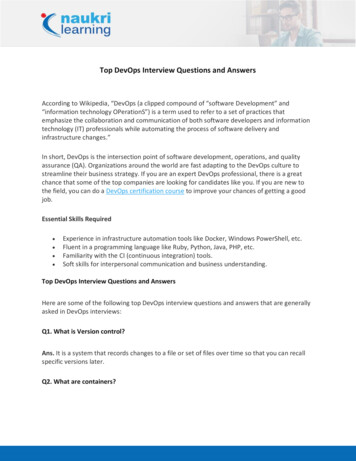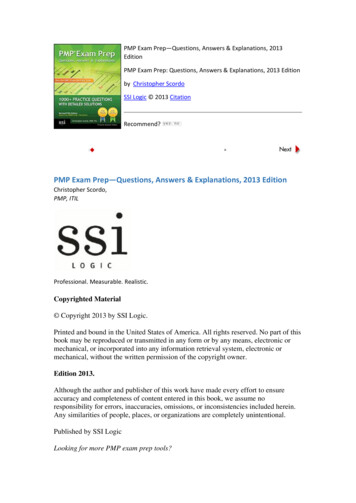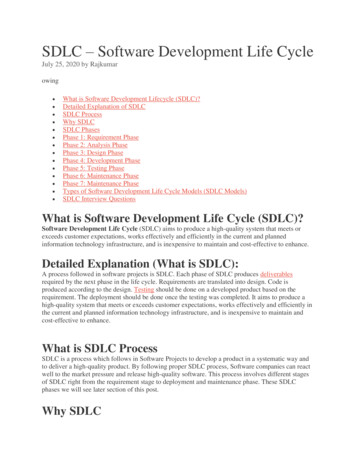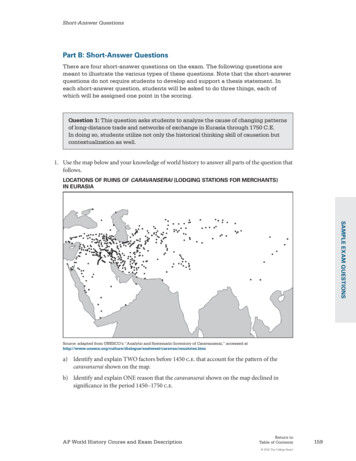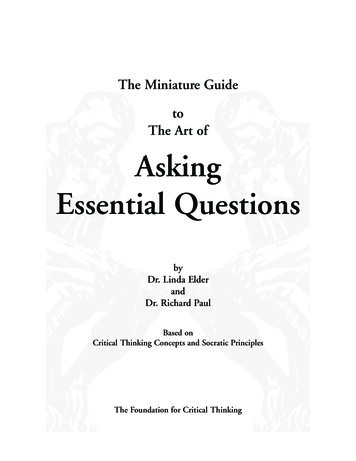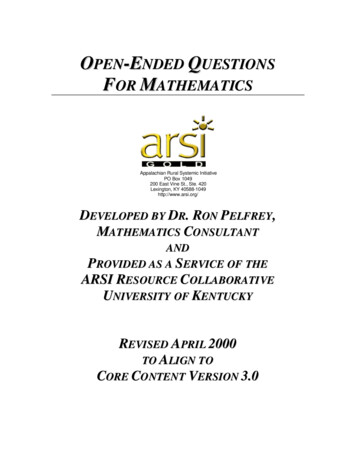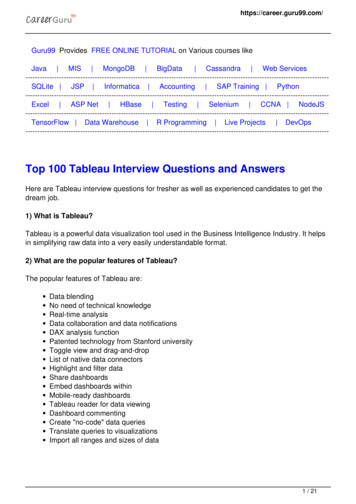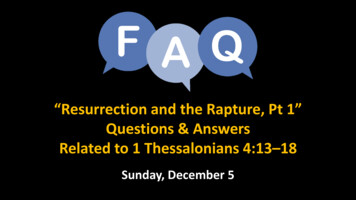
Transcription
“Resurrection and the Rapture, Pt 1”Questions & AnswersRelated to 1 Thessalonians 4:13–18Sunday, December 5
Q1: What is the position of Grace Community Church andThe Master’s Seminary on the timing of the rapture?“What We ment):THE RAPTURE OF THE CHURCH. We teach the personal, bodilyreturn of our Lord Jesus Christ before the seven-year tribulation (1Thessalonians 4:16; Titus 2:13) to translate His church from thisearth (John 14:1-3; 1 Corinthians 15:51-53; 1 Thessalonians 4:155:11) and, between this event and His glorious return with Hissaints, to reward believers according to their works (1 Corinthians3:11-15; 2 Corinthians 5:10).
Presentation of glorifiedchurch in heaven;distribution of rewardsBeginning of thechurch—those“in Christ”(Acts 2)Resurrection andrapture of the church—those “in Christ”(1 Thess 4:13–17)GreatCommissionCHURCH AGE
THE TRIBULATION PERIOD. We teach that immediately followingthe removal of the church from the earth (John 14:1-3; 1Thessalonians 4:13-18) the righteous judgments of God will bepoured out upon an unbelieving world (Jeremiah 30:7; Daniel9:27; 12:1; 2 Thessalonians 2:7-12; Revelation 16), and that thesejudgments will be climaxed by the return of Christ in glory to theearth (Matthew 24:27-31; 25:31-46; 2 Thessalonians 2:7-12). Atthat time the Old Testament and tribulation saints will be raisedand the living will be judged (Daniel 12:2-3; Revelation 20:4-6).This period includes the seventieth week of Daniel’s prophecy(Daniel 9:24-27; Matthew 24:15-31; 25:31-46).
Beginningof thechurchResurrectionand rapture ofthe churchCHURCH AGEDay of the Lord(punishment of the nations;revival of Israel)Secondcoming ofChristTRIBULATION*Timeline not to scale
THE SECOND COMING AND THE MILLENNIAL REIGN. We teach that,after the tribulation period, Christ will come to earth to occupythe throne of David (Matthew 25:31; Luke 1:31-33; Acts 1:1011; 2:29-30) and establish His messianic kingdom for 1,000 yearson the earth (Revelation 20:1-7). During this time the resurrectedsaints will reign with Him over Israel and all the nations of theearth (Ezekiel 37:21-28; Daniel 7:17-22; Revelation 19:11-16). Thisreign will be preceded by the overthrow of the Antichrist and theFalse Prophet, and by the removal of Satan from the world (Daniel7:17-27; Revelation 20:1-7). . . .
We teach that the kingdom itself will be the fulfillment of God’spromise to Israel (Isaiah 65:17-25; Ezekiel 37:21-28; Zechariah8:1-17) to restore them to the land that they forfeited throughtheir disobedience (Deuteronomy 28:15-68). The result of theirdisobedience was that Israel was temporarily set aside (Matthew21:43; Romans 11:1-26), but will again be awakened throughrepentance to enter into the land of blessing (Jeremiah 31:3134; Ezekiel 36:22-32; Romans 11:25-29).We teach that this time of our Lord’s reign will be characterizedby harmony, justice, peace, righteousness, and long life (Isaiah 11;65:17-25; Ezekiel 36:33-38), and will be brought to an end withthe release of Satan (Revelation 20:7).
Beginningof thechurchResurrection Secondand rapture of coming ofthe churchChristReign of righteousnesson the earthCHURCH AGETRIBULATIONMILLENNIAL KINGDOM*Timeline not to scale
Q2: If Christians will not be on earth when many of theevents of prophecy occur, why are those detailsimportant to us?(1) HOPE This world: hostility (1 Thess 1:6), persecutions (2:14),and hopelessness (4:13). The need: hope (1 Thess1:3), expectation (1:10),comfort (4:13–14), andencouragement (4:18; 5:11).
(2) HOLINESS This world: darkness and immorality (1 Thess 5:4–7). The need: alertness (1 Thess 5:6), self-control (5:6, 8),and edification (5:11).
Futuristic prophecy has a similar function for theChristian as historical narrative. A significant portion of the Bible is comprised ofhistorical narratives in which we never personallyparticipated. We need narratives for remembrance in order toworship and walk (esp. Rom 15:4; 1 Cor 10:6, 11). We need prophecies for expectation in order toworship and walk.
Q3: Since the prophecy of the rapture in 1 Thessalonians4:13–18 was given for moral purposes (comfort andencouragement), shouldn’t we refrain from taking itsdetails literally and establishing chronology? Many interpreters treat prophetic portions of Scripture—including 1 Thessalonians 4:13–18—as ambiguous. Literal interpretation is categorically rejected. “If you don’t like the message, just call it ‘poetry’ or‘apocalyptic.’”
But there is no indication that Paul has changed hislanguage in 1 Thess 4:13–18 from the rest of the letter. He calls his readers to treat his teaching with seriousness:“This we say to you by the word of the Lord . . .” (4:15). He uses words of sequence: “first,” “then,” “so.” He calls his readers to use not a general “message” (sing.)but his “words” (pl.) for comforting others (4:18). Moreover, we do not elsewhere dismiss doctrinal detailsin sections where moral exhortation is dominant (e.g.,Phil 2:1–11).
Q4: Why is the resurrection for believers so important?Aren’t we already glorified the moment we die andour souls go to be with Christ? Much of Christianity has been impacted by aphilosophical worldview called platonic dualism, whichcontends that the material realm is inherently inferior. All our problems—sin and suffering—can be tied to thematerial realm. Final salvation is thus believed to be emancipation fromthis earthly realm—“the soul forever in glory.”
However, the NT teaching on the resurrection and Jesus’own resurrection emphasize that bodiless, spirit-onlyexistence for us is not the ideal. 2 Corinthians 5:1–10; 1 Thessalonians 5:23“Our resurrection bodies will show the fulfillment of God’s perfectwisdom in creating us as human beings who are the pinnacle ofhis creation and the appropriate bearers of his likeness and image.In these resurrection bodies we will clearly see humanity as Godintended it to be.”—Grudem, Systematic Theology, 832
So how do we understand the state of the deceasedbeliever before his or her resurrection? It is not an unconscious state—“soul sleep”—as the soulwaits for the resurrection. It is conscious, “disembodied” existence with Christ inheaven, in a state of spiritual perfection where all strivingagainst sin has ceased. Philippians 1:23 – “But I am hard-pressed from bothdirections, having the desire to depart and be with Christ,for that is very much better” (also 2 Cor 5:6–8).
INTERMEDIATE STATE(sinless conscious existence in heavenwith Christ, but without completion)Death of thebelieverResurrection ofthe believer(1 Thess 4:13–17)
The enjoyment of the rewards given at the judgmentseat of Christ, immediately after the rapture, require theexistence of the body. 2 Corinthians 5:9-10 – “Therefore wealso have as our ambition, whether athome or absent, to be pleasing to Him.For we must all appear before thejudgment seat of Christ, so that eachone may be recompensed for his deedsin the body, according to what he hasdone, whether good or bad.”
seat of Christ, immediately after the rapture, require the existence of the body. 2 Corinthians 5:9-10 – Therefore we also have as our ambition, whether at home or absent, to be pleasing to Him. For we must all appear before the judgment seat of Christ, so that each one may be recomp
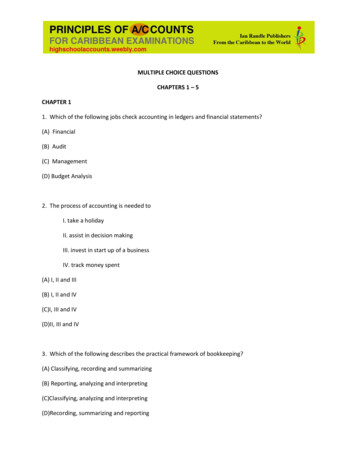
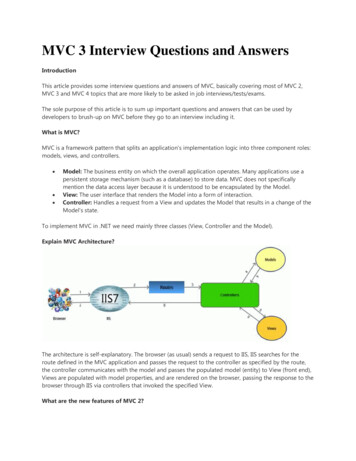
![Informatica Interview Questions and Answers [Scenario-Based]](/img/2/informatica-interview-questions-and-answers-scenario-based-1.jpg)
